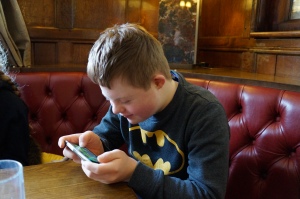 It’s not often that academic research drives me to tears. Actually, it’s not often that academic research drives me to anything, but there you are. I have an excuse; I’m on a course. Still, the last time I read anything in an academic journal it was about how views of femininity were expressed through medical texts about childbirth in the 16th Century. I, a young woman, a baby, was reading about long dead women’s lives, and the connection stopped there. It was four and a half centuries away after all.
It’s not often that academic research drives me to tears. Actually, it’s not often that academic research drives me to anything, but there you are. I have an excuse; I’m on a course. Still, the last time I read anything in an academic journal it was about how views of femininity were expressed through medical texts about childbirth in the 16th Century. I, a young woman, a baby, was reading about long dead women’s lives, and the connection stopped there. It was four and a half centuries away after all.
But now, today, a fully fledged grown up woman, a mother to three children, I don’t feel the same distance. Instead of the pleasure of interest and stimulation, a firing of the brain cells and a connection between a philosophical standpoint and evidence, I felt a sense of shock. There, on the page, without me having contributed anything at all, were aspects of my life; my mothering life.
I don’t think of Sam as disabled. To me, he is just Sam. OK, so we have more appointments to attend than anyone else I know, but, to me, he’s on a journey towards adulthood the same as anyone else. Since the day he was born and we were told that he had Trisomy 21 it’s been exactly the same. I know that he has a learning disability – I mean I live with him and it’s pretty hard to escape, but still. To me, he is just my boy.
But then, there is this thing about it being really difficult for me to work. I was at home for ten years before I ventured back into the workplace. R was stuck in a job he hated for seven of them. Yes, we were busy creating our family, but it would be disingenuous of me to claim that Trisomy 21 had nothing to do with my long years out. It did. We only just managed to send him out to the office.
And now that I am back at work it’s difficult. What am I supposed to do about blood tests, or eye checks, or orthotic appointments or hearing tests that fall on days when I am in the classroom? How realistic is it for me to have career aspirations when I keep having to take days off to care, to be poorly myself because we have Down’s syndrome in the family?
In a way it’s easier. I’m not so bored by the domestic duties of housewifery, I’m no longer going slightly mad. I’ve got something else to think about, other than obsess about my own children; I’m not so worried about money. And strangely, I don’t feel so voiceless.
There is a funny thing that happens to you when you become a mother, especially when you become the sort of mother who stays at home. You start off as a rational creature, your importance magnified, like your size, until that baby appears. And then, slowly but surely, you find your voice weakens, less heard in direct proportion to your length of service.
It’s partly the increasing ability of your offspring to say ‘no’ to you that saps your confidence. It’s partly living in a world dominated by relationships, a private existence, rather than a public one, and it’s partly what happens when other people get involved with your child.
For those of us with out of the ordinary children this happens straight away. Did that baby really belong to me? Was I really allowed to take him home? If I was a good girl, and checked in regularly, maybe they’d let me keep him. Once they’d got over the apologies for not spotting it, and the pressure to make sure it didn’t happen again, to find out who was responsible, genetically speaking, who was to blame, that is.
It starts off OK. Your observations are welcome in the matter of health. As a closely watching mother you can add plenty to the picture; you are an important decision maker, your word is final. But as the years pass and you move into the realms of education there is a subtle shift. You move from the foothills of acceptable anxiety, it’s new to you after all, to the mountain tops of pushy. Unrealistic. Hysterical, even. It’s astonishing how quickly your word is dismissed.
Before you know where you are you have to insist, you who kept your own bank account for years, who kept your own name, that he takes the morning off work and comes with you to a meeting because you can’t seem to make yourself understood and you watch, amazed, as he, your softly spoken wingman, stuns a room to silence with a single word and you feel as if you have travelled back in time, back to the days when women’s voices didn’t matter.
That education you had, those years you spent in the classroom, that professional and personal knowledge you garnered, becomes as nothing because you, as well as your son, carry a value laden label. Mother.
I thought it would be different. I thought we had moved on.



